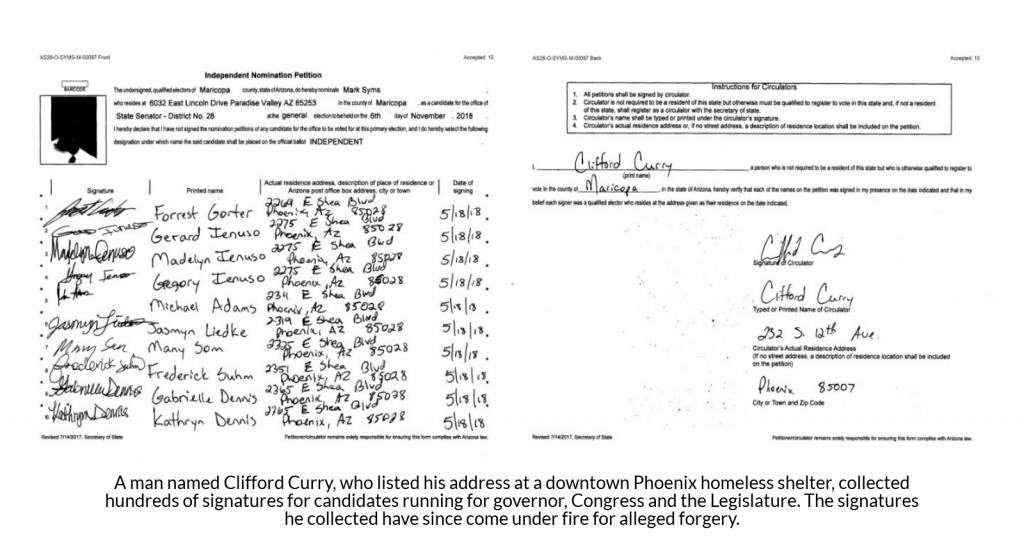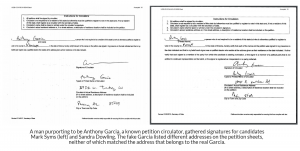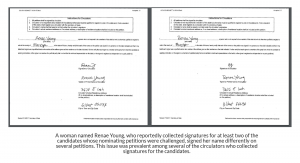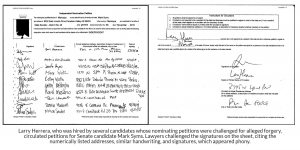
PHOTO BY KATIE CAMPBELL/ARIZONA CAPITOL TIMES
Aaron Lieberman is one of 19 true freshmen coming to the state House of Representatives, and one of four Democrats who overcame incumbent Republicans to claim his seat.
But he said he won because he told the people of Legislative District 28 that party labels weren’t more important than the one they all shared: Arizonan.
Lieberman once left Arizona to attend Yale University and kick-start his career, but now he’s back with his wife and two young sons, while his daughter follows in his footsteps at Yale. And he’s determined to represent all of his constituents, including Gov. Doug Ducey himself, who Lieberman described as a neighbor.
“I saw him at the polling place during the primary, and I told him, “I hope to represent you well,’” he said. “And I mean it. It’s 31-29 [in the House], but that’s 60 people who care about Arizona.”
 You were one of five kids, and you went to Yale, which is no small expense. What was your life like growing up?
You were one of five kids, and you went to Yale, which is no small expense. What was your life like growing up?
Growing up, I went to Madison Heights… and some great private schools here, too, Phoenix Country Day and Brophy. And particularly at Brophy, I really got interested in this idea of service to others. In the Jewish tradition, it’s called “tikkun olam,” like trying to repair the world. Sounds very lofty, but the basic idea is that you’re here to try to make the world a better place. I just kind of stumbled into a career building and growing organizations focused on helping low-income kids and particularly low-income preschoolers.
And you created a not-for-profit called Jumpstart while you were still in school?
I was a senior in college. I started it out of my college dorm room. … It was very tiny at the time. A lot of life is luck and timing, and I’m really blessed to have a lot of good timing. But my whole career, frankly including this run for the state House, has not been a part of any grand plan. … I’ve just been open to opportunities as they were presented.
I’m sure you’ve told that story a million times, so it comes out very casually. Tell me about that process in the dorm room.
I had worked at a camp in upstate New York that worked directly with low-income preschoolers in a residential setting. … Two-thirds of them had been physically or sexually abused. A lot of them were in foster care already at 3 or 4. But I had many parents or guardians at the end of the three weeks say, “This looks like a different little boy. Like this doesn’t look like the same kid that we put on the bus three weeks ago.” The power of that intervention was very, very obvious but also its limitations. … A group of us who worked at that camp had this idea of making it happen right in the communities we serve. … Like any new entrepreneur, we refused to take no for an answer and started working until something happened.
How do you think your experience at that camp affected you?
It’s had a huge impact on me. I was a pretty typical middle-class kid, and my parents had a strong set of values and said everybody has an equal opportunity. And then, I got out in the world dealing with low-income kids who had anything but an equal opportunity. I think it was that dissonance between what I wanted to believe, what I hoped was true and what I actually saw in the world. It was very motivating, but it was also real work.
That concept of equal opportunity is referenced a lot in Arizona in terms of school choice and to support things like school vouchers. What’s your perspective on that?
It’s a fine theory, but it’s completely contradicted by the facts. So much of the voucher spending has ended up helping better-off families pay for private schools. I went to some great private schools. I have nothing against private schools. I just think that if you want to send your kids to private school, you should pay for it.
Do you think you picked up any lessons working with preschoolers that will help you here at the Capitol?
Things can be messy, and that’s OK. … The biggest thing that motivated me to run was feeling like we were not making common sense investments that help build a better future for all of Arizona. I’m an entrepreneur. I want this to be a great state for business. It’s actually very important to me. At the same time, you can’t have great businesses if you don’t have great employees, and you can’t have great employees without a great K-12 system.
This is a great place to raise a family. This is a great place to start a company. This is a great place to build a company. We’ve been so caught in a lot of this political infighting that we’ve lost what’s a common goal for all of us, not as Democrats or Republicans, but as Arizonans. … The governor signed some 350-plus bills into law last session – 95 percent of them were sponsored by Republicans. There’s no way any one party has 95 percent of the good ideas for the state.
What did your sons think of your decision to run for office?
I’d say it’s a split decision on the homefront. My older son has been very encouraging. My second son – I remember at one point, he said to me, “You’re not even going to go to my baseball practice.” And I said, “I’ve never gone to your baseball practice.” But he’s making his peace with it, and he did say last night, “If you lost, what would we talk about at dinner?” We have a lot of political conversations at dinner, and it’s fascinating to see their view of the world. They’ve had a very interesting life experience.
How so?
Both our boys were born in Ethiopia. We adopted them when they were children, so that’s part of it. They grew up when we were living back east, and we lived in Harlem. … One of the things I love about living in Arizona is there’s such a broad cross-section of political views. We’re not in a bubble like you can be in other places. I still remember when my son was in fourth grade, and he came home and said, “Harry says Obamacare is killing the economy with its taxes.” That was like a fourth grade conversation he would have never heard on a playground in Harlem, and I thought that was terrific.






